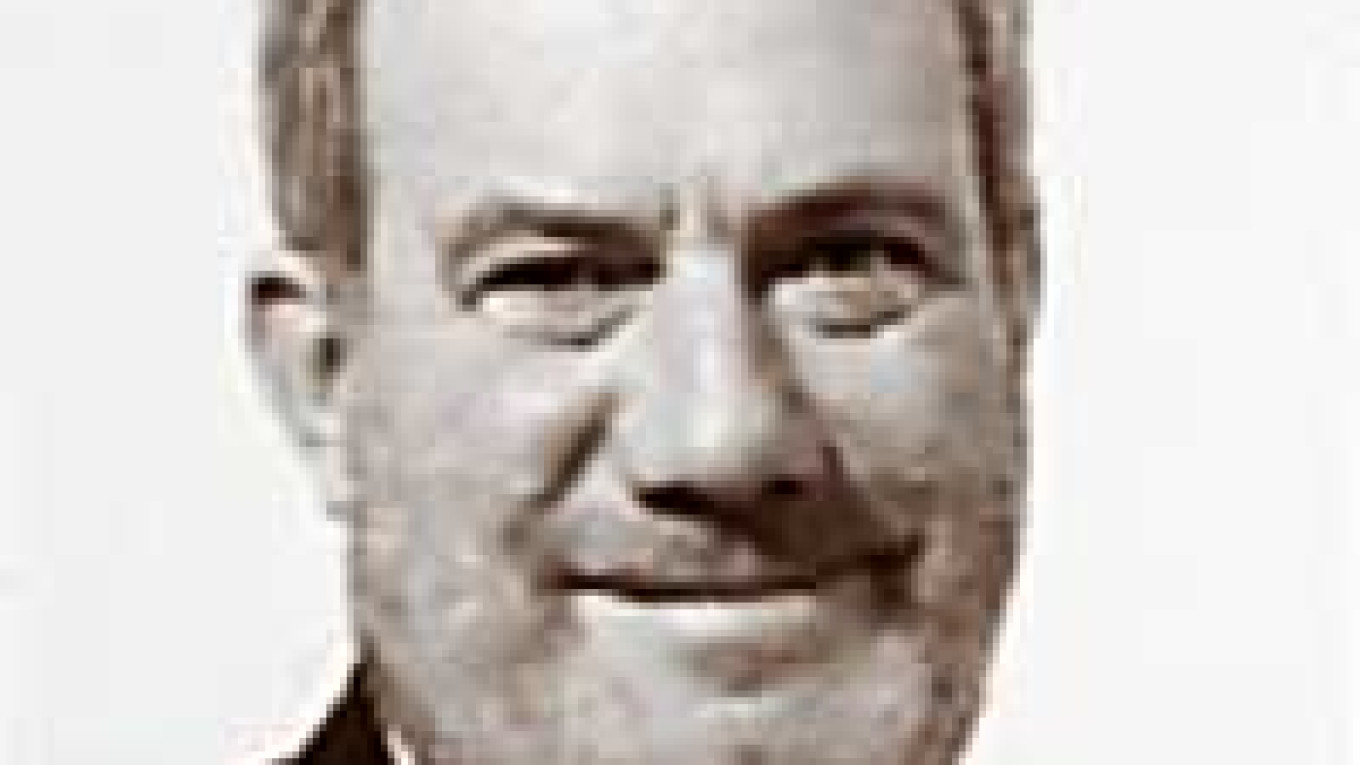More than two decades later, the London resident still visits the city periodically, though now only to check up on the finances of Dinternal, the book-distribution company that owns the Anglia bookshops in St. Petersburg, Moscow and, most recently, Samara.
Though hard-pressed to name his favorite author, conceding only that "the new Patricia Cornwall is good for one plane trip," and hesitant to call himself a big reader, Moggach, CEO of Dinternal, does admit his family is "booky." His former wife, Deborah Moggach, is a novelist and his son has traveled around Africa and Europe for Dad's other book business, a London-based company that represents publishers abroad. His house, he said, resembles a library.
If books let your mind go places, Moggach is concrete proof. A globetrotter who is sometimes unreachable for days, he returns Tuesday from Tanzania for a day in London and was due back in Moscow this week. When employed by Penguin books, he visited almost every country in Africa and Europe, selling English-language texts to wherever a market could be found. Prior to that he was Middle East manager for the Oxford University Press, living in Pakistan for two years.
In fact, it was his appetite for travel, rather than an affinity for flipping pages, that defined his career.
Just graduated from college and hunting for first employment, Moggach didn't pass the exam to enter the British Foreign Service and instead was offered a job in the Home Office, which he declined. But the Oxford University Press was recruiting at the time, offering the chance to travel.
"They said there could be a big international dimension to this career, and I took the job. And the die was cast. And there I was, stuck with books."
The Anglia bookshop, tucked away on Khlebny Pereulok in a building that formerly housed the Russian-American press center, is a familiar place for readers of English, both locals and expats. But the bulk of the business is actually across the street, where shelves after shelves are stacked with not only British classics and the latest American fare, but learning materials on sale for the country's widespread army of teachers and students of the English language.
He and David Williams, an Englishman who was then-international sales director for Penguin, had initially intended to set up a wholesale distributor for teaching materials.
"Since we both had a pretty good idea of the Russian market we felt that when times change there would be a possibility here of setting up a business," Moggach said.
Former state importer Mezhdunarodnaya Kniga, through which they sold books during the Soviet period, was privatized, and is now one of Dinternal's competitors.
In 1994, the pair cast around for other partners and found a Moscow-based Canadian and a Portuguese businessman, who already had his own Dinternal in his home country. They adopted that name and all four put in money, starting operations in 1995 with office space on Pyatnitskaya Ulitsa that was outfitted with one table, one chair and books in the hallway. In 1996, the company moved to Khlebny Pereulok and a year later Anglia opened. Ownership of the company is still split among them, with Moggach trying to visit at least a week every month, though practically all management is now run by local staff.
The August 1998 crisis hit Dinternal hard, as it coincided with the start of the school season, their peak sales period. Overstocked with materials that suddenly cost their key customer base several times their teaching salary, the company had to renegotiate payment terms with suppliers and cut about a third of its staff. Moggach said in November 2000 sales were still about 60 percent of pre-crisis levels.
However, expansion has crept along and the retail shops are profitable. A similar bookstore/distributor in St. Petersburg opened right after the crisis and the Samara branch in fall 2000. Dinternal's latest addition to Moscow is the Atlantic bookstore, which targets Russian readership with "more coffee table stuff," such as art and design books. With the Portuguese partner, Moggach also has an ownership slice of a Dinternal in Kiev.
Enthusiasm for his product here has hardly waned through the years, though buyers' tastes have been altered since the abolition of censorship.
Years ago, paperbacks at the book fair could be marked up five times the original price, yet people would still buy, Moggach said.
"I do remember the enormous interest in the collected works of Sigmund Freud, interest that is now almost zero. We would have people spending all day at the fair reading the book and making notes from it.
"Hmm. Times have changed."
A Message from The Moscow Times:
Dear readers,
We are facing unprecedented challenges. Russia's Prosecutor General's Office has designated The Moscow Times as an "undesirable" organization, criminalizing our work and putting our staff at risk of prosecution. This follows our earlier unjust labeling as a "foreign agent."
These actions are direct attempts to silence independent journalism in Russia. The authorities claim our work "discredits the decisions of the Russian leadership." We see things differently: we strive to provide accurate, unbiased reporting on Russia.
We, the journalists of The Moscow Times, refuse to be silenced. But to continue our work, we need your help.
Your support, no matter how small, makes a world of difference. If you can, please support us monthly starting from just $2. It's quick to set up, and every contribution makes a significant impact.
By supporting The Moscow Times, you're defending open, independent journalism in the face of repression. Thank you for standing with us.
Remind me later.


